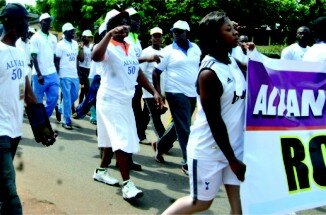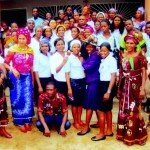Varsity dons warn against under-funding of education – As AIFCE celebrates Golden Jubilee
 Activities marking the 50th anniversary of Alvan Ikoku Federal College of Education, Owerri, kicked off on November 7, 2013 with Special Lecture Forum on the theme: “Funding Education Fast-tracking Development and the UN Prescription for Nigeria.
Activities marking the 50th anniversary of Alvan Ikoku Federal College of Education, Owerri, kicked off on November 7, 2013 with Special Lecture Forum on the theme: “Funding Education Fast-tracking Development and the UN Prescription for Nigeria.
In her address, the Provost of the institution, Dr. (Mrs.) Blessing C. Ijioma, who was represented by the Deputy Provost, Sir B.C. Maduka said, she feels privileged to superintend over the great college at this auspicious moment of her golden jubilee expressing optimism that it would herald better and more glorious days for the college and education in Nigeria.
She stated that education is the greatest force that can be used to bring change. positing that if Nigeria is to meet her lofty dreams of becoming one of the greatest nations and economies in the world come the year 2020, she must take pragmatic and urgent steps to adequately fund education at all levels.
She said that under-funding of education is the bane of most problems encountered in the sector ranging from infrastructural decay, disillusioned work force, lack of laboratories, libraries etc.
“It is the cause of brain drain of our intellectuals and the mass exodus of many Nigerian students to different parts of the world even in West Africa where Ghana has become the choice destination for tertiary education and for education in Nigeria to be worthwhile, at par and in tandem with UN specification, Nigerians must work assiduously at adapting best global practices as regards funding of education”.
To fast-track development, the Provost advised that the miserly funding of education must be addressed with urgency.
In the lead lecture presented by Prof. Mrs. Grace Offorma, she defined “Education” as a process of equipping man with the necessary knowledge skills, attitudes and values for survival in the society. She said that money promotes the purchase and maintenance power with which educational institutions acquire their human and physical inputs.
Listing the sources of education funding, she made mention of government sources which include funds for capital and recurrent expenditures and special grants and non-government funds which come from different sources as stipulated in the national policy on education. She said that the financing of education is a joint responsibility of the federal, state and local government.
Other sources of revenues for most institutions are school fees, school activities, grants from philanthropic organizations, alumni fund, levies and endowment fund.
Continuing, she said that based on the data from UN, in Nigeria 58.5% of the children in school are not learning, 10m students are out of school in Nigeria while in the entire world 60m is the case. With the above statistics, it is obvious that the system of education in Nigeria is weak and this weakness reflects in the level of development.
Quality educational system will attract students from other countries thereby contributing to the economy of the country, but this entails adequate provision for access and equality, learner friendly classrooms. Also needed are ICT facilities, linkage of education to the world of work, competent, effective and efficient teachers in terms of knowledge and pedagogy and of course adequate funding”.
Concluding, Prof. Offorma said: “Education is the master key through which sustainable development can be accessed; investment in the education and training of current and future operations is the only way to break a cycle of poverty, conflict and intolerance”. She warned that continued under-funding of education is under development.
In another lecture, the Vice-Chancellor of Madonna University, Okija, Anambra State, Prof. Chuks E. Ezedum said that under funding of education is a great problem to Nigeria.
The problem stems from both the country’s mono economy and mismanagement of public resources, fixing the problem therefore requires diversifying the economy and stemming the tide of corruption”. He also advised that avenues for scholarship should be created so that those who cannot afford to pay for school fees but are brilliant enough can be awarded scholarship. Apathy, segregation and nepotism should be totally eradicated. He cautioned that leaders were given the economy to midwife us and not to milk it.
Another lecturer, Prof. Chinedum Nwajuba of the Imo State University Owerri recalled that formal education was a sure route out of poverty and emergence of some sort of elite. According to him, “Youth unemployment is number one challenge to the Nigeria state. Nigeria’s schools need to reflect current realities. The era of certificates for government or private sector jobs is fast receding. Schools need to equip students with practical livelihood assuring skills that lead to the emergence of entrepreneurs and problem solving graduates. Curriculum change is urgent. Nigeria’s population is increasing. The number of those who will seek school places will increase further to the future”.
Read also Related Posts
Comments
comments

 Fr. Anthony Uwakwe celebrates Golden Jubilee of priestly ordination
Fr. Anthony Uwakwe celebrates Golden Jubilee of priestly ordination
 Praises as Nwigwes’ celebrate Golden Jubilee of marriage – Jonathan, Okorocha commend couple
Praises as Nwigwes’ celebrate Golden Jubilee of marriage – Jonathan, Okorocha commend couple

